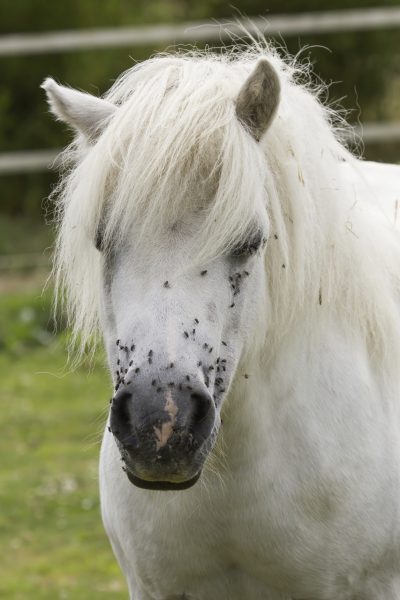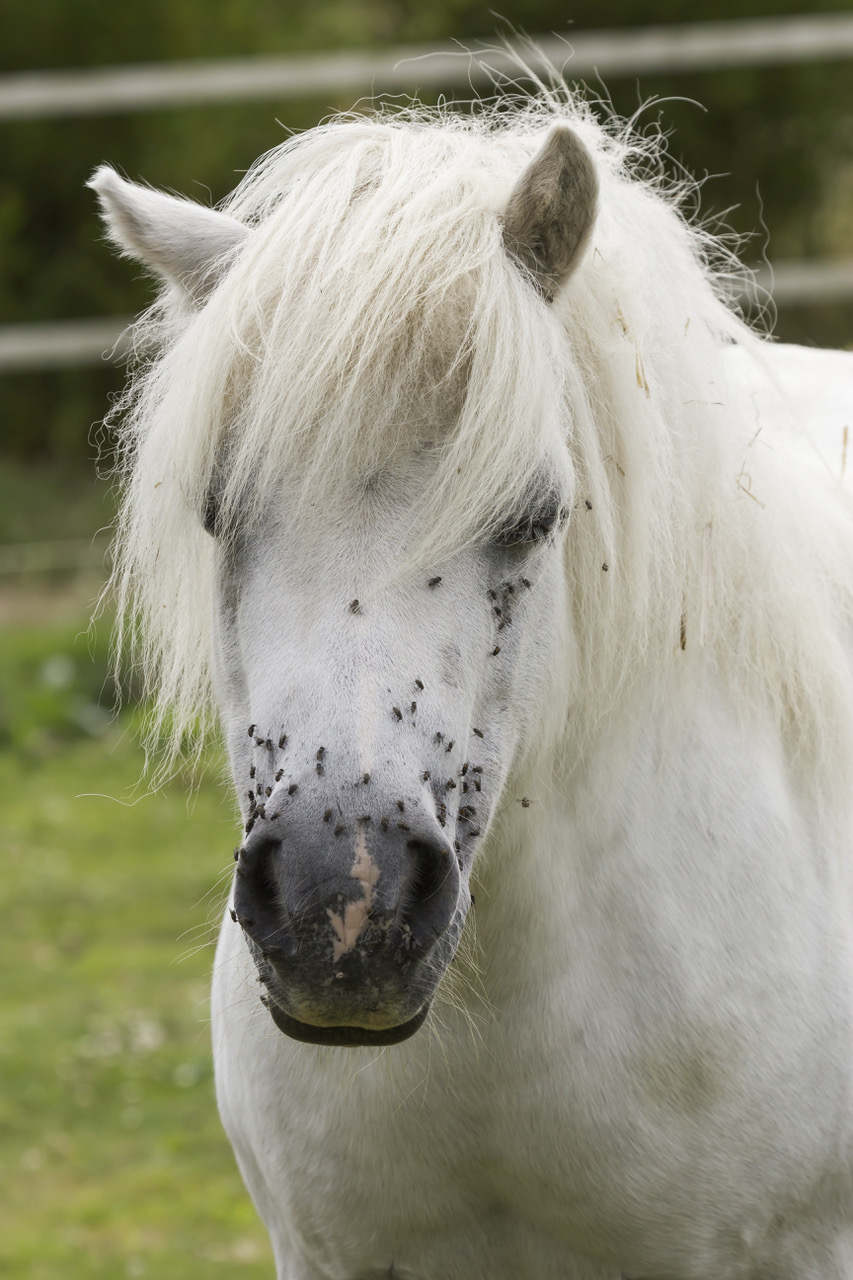London, UK – Apr 15, 2019 – Zoetis Inc. today announced that horse owners should consider taking action early to keep flies under control. “Flies are one of the down sides of warmer weather but if you act early to reduce the numbers breeding in your horse’s environment you can help stop them bothering your horse throughout the entire season,” said Zoetis vet Wendy Talbot.1
Horses are prone to attack from many species of parasites including house flies, horse flies, black flies, blow flies, bot flies, mosquitoes, midges, lice, ticks and mites. They can cause dermatitis, pruritic (itchy) conditions, lumps and skin lesions. They can also cause conjunctivitis, headshaking and contamination of wounds plus have the potential to spread other diseases too2.
Biting midges, Culicoides spp. are a particular pest as they can cause sweet itch. Mosquitoes are also well known airborne irritations. Over 30 species have been recorded in the UK, including those with the potential to spread diseases such as West Nile Virus, a fatal disease that is luckily not found in the UK at present.2,3 Flies may also carry other parasites that can infect the horse such as Habronema spp. and Onchocerca cervicalis, which can affect the skin and in extreme cases the eye.4
Most flies thrive and breed in warm, moist conditions such as on dung, rotting bedding or spilt feed material. From these unsavoury places they can spread bacteria to the horse, especially to vulnerable areas such as the eye and wounds.1
“The best way to control the nuisance of flies is with good environmental management to control their breeding grounds and a proven fly repellent or insecticide,” said Wendy. “It’s important to understand the difference between a repellent and an insecticide though; a repellent simply makes the horse less attractive to flies whereas an insecticide aims to kill the fly as soon as possible after contact with no biting needed. For maximum effectiveness insecticide treatment should be started before the fly season has begun, to control breeding, and continued at regular intervals throughout the season.”
Eleven tips from Wendy Talbot to help keep your horse fly-free:
· Use a spray insecticide on your horse’s coat and a specifically designed cream product on sensitive areas like ears and sheath.
· Try a specifically designed insecticide for areas around the horse’s stable where flies congregate such as the roof or on mesh around the windows – always check the product label carefully to ensure it is safe to use in a horse’s environment.
· Clear horse droppings away from the stable and pasture on a daily basis so that flies can’t breed in them.
· Muck heaps should be kept away from where your horse sleeps and grazes.
· Stables should be scrupulously clean at all times.
· A clean, well-groomed horse will generally attract fewer flies.
· Make sure there are no puddles near the stables.
· Invest in a fly rug and/or a fly facemask for your horse if it is badly affected.
· Spraying fly rugs with insecticide or repellent will provide extra protection.
· Stable your horse in mornings and evenings when most flies are about.
· Only use an insecticide or repellent that’s designed for use on horses. Always speak to your vet or suitably qualified person (SQP) for the right information on what to use.
Some products are classified as POM-VPS insecticides and need to be prescribed by an SQP or a vet.
Visit www.horsedialog.co.uk to find out more about fly control.
References
1. PennStateExtension (2105) Equine Insect Pests. https://extension.psu.edu/equi ne-insect-pests
2. Nick Golding, Miles A Nunn, Jolyon M Medlock, Bethan V Purse, Alexander G C Vaux and Stefanie M Schafer. (2012) West Nile virus vector Culex modestus established in southern England. Parasites & Vectors 5:32 doi:10.1186/1756-3305-5-32.
3. Public Health England (2014). Advice on staying mosquito-bite free this summer. https://www.gov.uk/government/news/phe-advice-on-staying-mosquito-bite-free-this-summer–2
4. Lassaline, M (2018) Disorders of the eye and vision. In: Equine Internal Medicine (4th Edition), Eds. Reed, SM, Bayly WM & Sellon DC. Elsevier Inc., St. Louis, Missouri, P1139 – 1158

Pony bianco in campagna. Credit Zoetis archives.
About Zoetis
Zoetis is the leading animal health company, dedicated to supporting its customers and their businesses. Building on more than 65 years of experience in animal health, Zoetis discovers, develops, manufactures and commercializes medicines, vaccines and diagnostic products, which are complimented by biodevices, genetic tests and a range of services. Zoetis serves veterinarians, livestock producers and people who raise and care for farm and companion animals with sales of its products in more than 100 countries. In 2018, the company generated annual revenue of $5.8 billion with approximately 10,000 employees. For more information, visit www.zoetis.com.











